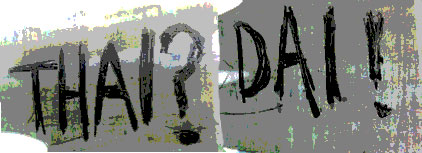
Salutes Asian Rock from the 60's-70's

Salutes Asian Rock from the 60's-70's

![]()
An excellent collection of Luk Thung to Luk Krung ("song of the countryside, song of the city") from Finders Keepers/B-Music.
An interesting mix of eastern and western instrumentation, using traditional thai musicality mixed with electric guitarisms.
I particularly enjoyed the cool fuzz guitar of Sroeng Santi's "Baa Baa Buam Buam" and "Nam Nun Pang", as well as the Black Sabbath
"Iron Man" riffage of "Kuen Kuen Leung Lueng", the anthemic shout-singing of Teungjai Bunpraruksa "Kanong Krung"
and the
stop-start comedic stylings of Plearn Promdan, whose song "Kosos Tee Det" seemed to translate to a ghost having acne!!
The song "Pu Yai Lee Santana" by Rung Fah Puping (pooping?) features an excellent guitar lick that pays respect to Carlos Santana.
Samples of this fine music can be found on the respective websites
below who have reviewed Thai? Dai!, click the logos/links for m
ore. Dai!
Finders/Keepers
It's possibly a misnomer to label music recorded outside of the USA or Europe with terms such as `psyche' or `surf' as it is often just a stylistic innovation based on exposure to foreign records via the radio or music stores. It doesn't necessarily chime in with any of the social shifts or changes that accompanied the music's development in the West. Even in America, the concept of teen culture was relatively new during the height of these genres popularity. People who could afford to take advantage of these new freedoms often had the financial cushioning to do so. This factor was amplified in South East Asia, and the music shouldn't be considered nationally representative - it's a more scaled down phenomenon, relevant to a small cross-section of society.
By the same token, this wasn't just bland copycat music to widen a band's audience, or to entertain expat patrons in bars or clubs. This was a sincere desire to experiment and repackage local sounds without necessarily needing to make a statement. The musical information was processed and partially recast amidst a blend of local music and arrangements, transposed onto drums, electric bass, guitar and keyboards.
Although in the mid-70s there was a wider protest movement in Thailand that found it's musical outlet in the `songs for life' of Caravan and Carabao, the music collected here was not part of the same aesthetic, although it's possible there was some musical overspill.
The styles featured on this compilation fall somewhere between Luk Thung (`song of the countryside') and Luk Krung (`song of the city'). Bangkok was a particular melting pot for the evolution of these two genres, the former alluding to musical themes and lyrics aimed at the wider national population, the latter looking westwards with a more urban `sophisticated' audience in mind. The tracks here were experimentations or dice rolling by both little known groups, as well as established figures like Plearn Promdan. Some tracks might represent a specific artist's only foray into this musical area.

Dusted Magazine
Thai? Dai! is a rich and comparatively thoughtful addendum to the deep stack of recent psychedelic compilations from Thailand and Southeast Asia. Rich because almost every song is steeped in references, and thoughtful because its curators, Chris Menist, Maft Sai and Andy Votel, have put in plenty of time and love. This comp is also the culmination of a recent Bangkok-centered movement led to a significant degree by none other than Menist and Maft, who have in the span of a few years made a name for themselves with a flurry of boutique projects that include reissues, online mixes and parties. Thai? Dai! is, in this sense, not just a recovery of lost sounds, but a document of an ex-patriot musical community with a lot of energy in Bangkok right now.
As Menist himself confesses, the tracks on this comp “shouldn’t be considered nationally representative.” Check out some of Maft Sai’s DJ mixes and you’ll hear heavy doses of outré jazz, reggae and druggy production choices – key symbols of global hipster listening, but mostly peripheral to Thai aesthetics then and now. Maft’s signature move is to select vintage tracks that resonate with edgy ears, but which still read as exotic. Educated in Europe but today based in Bangkok, Maft is in an ideal position to broker this material for Western audiences. Menist has enjoyed success through similar channels, and both he and Maft have gotten plenty of warm attention from local English-language media.
The duo’s work, in turn, serves a worldly farang constituency. When Sroeng Santi’s “Kuen Kuen Lueng Lueng” leads off this comp by launching unapologetically into the riff from “Iron Man,” and Ploern Promden’s “Ying Ting” cops measures directly from the soundtracks of Ennio Morricone, you’re being flattered. (As well as hearing something telling about the still-common Thai attitude toward intellectual property!). Just as the heavy bass and fuzzy guitar will remind you of indigenous European psychedelia, you’ll hear in these musical citations confirmation that the appeal of early metal and spaghetti western soundtracks was as universal as you suspected. But the truth is that Thai listeners, while frequently charmed by Western music, are not necessarily listening in ways or to the things you might expect. Blah brass tunes and mild early rock and roll were among the most important mid-century global influences on even the best Thai pop, joined as key references during the war by the more masturbatory side of Santana. Nowadays, art-world-friendly Bangkok musicians who grew up in the 1990s are more likely to namedrop Oasis than My Bloody Valentine. Meanwhile, many other Thai genres are bluntly parochial, eschewing global trends as much as they can. All of this is to say that Thai? Dai! is not so much a retrospective of a forgotten Thai musical past as it is a report from a thriving but ultimately small cosmopolitan present, from a scene that’s had to filter through a lot of records to find the songs that fit its prefigurations of taste.
This present sounds, thanks to figures like Maft and Menist, a lot like this compilation, the tracks for which were in fact tested at live shows. Their Paradise Bangkok parties are anthropologically fascinating – Bangkok has plenty of ex-pats who come here for business or sex, but just recently seems to have reached a hipster quorum. A friend marveled the other day, nursing an expensive well drink at a Paradise Bangkok event, that so many people who looked like Brooklyn even lived in Bangkok, let alone were packed into one bar. The crowd was dancing to many of the same songs featured on Thai? Dai!, all of which would have been equally perfect for a soul night set in New York.
I meanwhile marveled at the vast distance between these listeners and the ones less than a mile away, over at the similarly-named but otherwise utterly distinct Bangkok Paradise Night Bazaar. The second crowd, almost all Thai, drank Sangsom whisky out of plastic bags and danced to fast (and burningly loud) lam sing under the gaudy neon lights of a converted parking lot. There was something striking about how Menist and Maft’s audience was so unaware of the parking lot scene, despite their proximity, and how that (much larger) scene likewise knew nothing about Maft and Menist’s set, including the music it featured. The Paradise Bangkok crowd, so familiar, suddenly seemed like an ethnic enclave.
Even the content of the Thai? Dai! songs felt out of place in the light of the comparison. The singers weren’t waxing earnest about acid trips and peace, but writing poetry about the fluctuating price of Thai goods and inept village headmen. The goofy vibraphones we expect from psych were there, and the percussion was rich and busy, but there was something off-kilter in the spirit of the words. Misinterpretation is of course the engine of much musical creativity – I’m tempted to say all – and it drives the retro-obsessed Bangkok ex-pat/hi-so Thai hipster scene as much as it once drove Teungjai Bunpraruksa to channel The Sonics while singing about half an eyebrow (!). In that sense the scene marked by Thai? Dai! is doing exactly what people always do when they get excited by exotic sounds. But Western consumers of non-Western music, from devotees of Putumayo straight on through to Sublime Frequencies, can fall prey to narcissism by listening only to material that echoes what they already recognize musically, despite their honest intentions. It is thus worth mentioning, not as condemnation but as fact, how much "you-centric" curatorial work goes into making compilations like Thai? Dai! sound like objective histories. By Ben Tausig

Boomkat.com
Absolutely Killer collection of niche, mid-70s Thai music tracked down and collated by the irrepressible crew at Finders Keepers. Ever since that 7" of Sroeng Santi's Black Sabbath cover sneaked out last year we've been aching for the full length set, assured by the bods at FK that it was going be something heavy. The final, outstanding product is unique not only for the fact that many of the tunes are previously unissued, even in Thailand itself, but also for the fact it represents a very small, specific strain of sonic fusions/experiments, which while influenced by American and European 'psyche' or 'surf' music could never comfortably be called either. Falling somewhere between the indigenous styles of Luk Thung (song of the countryside) and Luk Krung (song of the city), these fourteen tracks used the newly available electric bass, guitar and keyboards to reset traditional Thai memes in a fuzzed-up and groovy-as-heck context, no doubt aware of their foreign counterparts, but disconnected from their politics and societal impositions. Like recent excavations of Cambodian rock, the brilliance of this music partly stems from the shock value but the effect lasts much longer when you really start to digest their crazy juxtapositions and incredibly unique, innate sense of funk. From Plearn Promdan's outrageously heavy western tribute 'Ying Ting' to Sroeng Santi's aforementioned Sabbath cover, to the twinkling xylophone and limbre funk of Rung Petchburi's Pai Joi' and the fiercely psychedelic, exotic burn of Teungjai Bunpraruksa's 'Kanong Krung' and it's utterly deranged bassline, this album is a total revelation. 'Thai! Dai!' is simply the most distinctive record Finders Keepers have released since the 'Pomegranates' LP, and requires your attention immediately. Very heartily recommended!
![]()
Paris DJs.com
New 'Sounds Of Wonder' compendium featuring the heavier side of the Lukthung underground from Thailand's finest disfunctional outsiders.
Proto punk-funk, warped cover versions and jaw dropping jams that belie belief! "Finders Keepers are pullin' out the purple olive" (Cut Chemist).
Even within Thailand the majority of these tunes remain unissued, so it's with great pleasure that we present this glimpse of the strange underbelly
of Thai Luk Thung in all its unique, original and outlandish glory - a small snapshot of an otherwise forgotten era.

Holy Warbles
'Hot on the heels of Soundway Records consummate selection of Luk Thung, Jazz and Molam forms from Thailand comes this
killer compoof similar, heavier styles from the Finders Keepers crew. The fuzz bleeds through the garage-rock, the xylophones twinkle
inside the pop and the distortion bends the psych into bold, never-before-heard new shapes... Wild, unbridled exotica from another time
and place to the one you are currently sitting in. Probably...
![]()